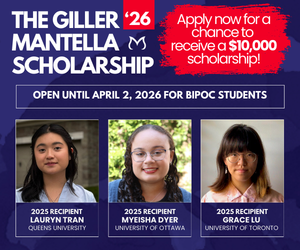We all need to support international students’ career goals
The IRCC regulations aren’t the only big shift in the international student space.

When it comes to internationalization in Canadian higher education, this year’s big headlines have focused on the changes to the Immigration, Refugees and Citizenship Canada (IRCC) regulations. These changes are significant and will have a sweeping impact on the sector. However, the buzz about this change has overshadowed another one: the shift in prospective and current international students’ perceptions of how desirable Canada is as a study destination. Soaring costs of living combined with lower salaries among international graduates is souring our institutions’ and our sector’s reputations, and could lead to challenges attracting future international talent.
There is ample public discourse around our institutions’ responsibility to ethically recruit and support international students. What is missing is the discussion of our individual responsibility in these processes. Most individuals working on campus are not involved in recruiting students. In contrast, many individuals working on a campus directly or indirectly support students once they arrive. In other words, the responsibility for supporting international students specifically does not rest solely with the international student advising office or the career centre.
I have worked in career development at three public institutions in two provinces. Through these experiences, I have learned that many faculty and staff defer to their campus’s career centre to support international students in navigating the labour market and landing a job. While these units offer highly relevant services, career development research demonstrates that faculty, academic advisors and other professionals on campus also have a significant influence on students’ career choices. If the responsibility for their career preparation is siloed to the career centre, we risk missing opportunities to help our students succeed, to ensure our disciplines and institutions attract new students, and for Canadian society more broadly to benefit from the international talent we’ve trained.
According to Brainstorm Strategy Group’s 2023 survey of more than 21,000 Canadian postsecondary students, the top reason students enroll in higher education is “to prepare for a job or career” — given the option to choose three motivators from a long list, 61 per cent selected this one. Only 38 per cent selected the next most-popular options, “to increase my knowledge in an academic field” and “to increase my earning potential.” Many students view their experience on campus through a career lens. They seek majors, courses, co-curricular opportunities and work experiences that will help them explore their options and achieve their career goals. I have found this to be especially true among international students, whose tuition typically costs multiple times that of domestic students and who face additional barriers.
As you and your colleagues plan for the 2024-2025 academic year, I implore you to keep this in mind. What story are you telling prospective students about how your discipline, courses, or the opportunities within your department can prepare them for the Canadian labour market? Do you include any language on your syllabi that tells students how you or your institution can support their career development? Do you craft assignments that help them articulate the skills they’ve developed in your class, and explore how they can apply these skills in various careers? Do you collect data on your graduates’ career outcomes, or involve alumni as guest speakers in classes or at departmental events? When talking to students about their career interests, do you perpetuate the myth of the linear career or do you acknowledge that their future career will likely be non-linear and teach them how to navigate this uncertainty? If you’re not telling these stories, consider that students arrive on campus with their own stories packed in their luggage: ideas gleaned from peers, family members, social media, and the culture of their home country(ies), and make choices accordingly.
I have heard from faculty members who are uncomfortable talking about careers with their students because they have not worked outside of academia in many years, if ever. I have heard from others who resist talking about careers with students because they lack the expertise they need to feel confident doing so. Faculty members are also reasonably overwhelmed by the demands of their job, and sometimes don’t see career development as part of that job.
To that, I say this: I hear you, and I hear my students, who feel disappointment and despair when those who are supposed to support them overlook an area of their life which causes them so much anxiety. I hear you, and I hear endless news and anecdotes about skills gaps, talent shortages in certain industries, and how difficult it is for new graduates — especially international graduates — to land decent jobs. I hear you, and I hear my career development colleagues, who are keen to partner with you and help you develop the tools to become effective career influencers. I hope you will hear us, too — and that we can work together to better support the international students on our campuses. In doing so, I believe we can begin to turn the tides for our sector and our country.
This column is coordinated through the Internationalization of Student Affairs Community of Practice of the Canadian Association of College & University Student Services (CACUSS). For comments or questions please contact [email protected].
Featured Jobs
- Director of the McGill University Division of Orthopedic Surgery and Director of the Division of Orthopedic Surgery, McGill University Health Centre (MUHC) McGill University
- Canada Impact+ Research ChairInstitut national de la recherche scientifique (INRS)
- Engineering - Assistant Professor, Teaching-Focused (Surface and Underground Mining)Queen's University
- Human Rights - Assistant Professor (Expertise in Human Rights related to Artificial Intelligence and Digital Security)University of Winnipeg
- Soil Physics - Assistant ProfessorUniversity of Saskatchewan
















Post a comment
University Affairs moderates all comments according to the following guidelines. If approved, comments generally appear within one business day. We may republish particularly insightful remarks in our print edition or elsewhere.